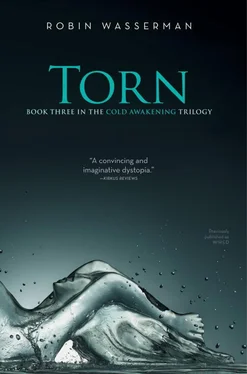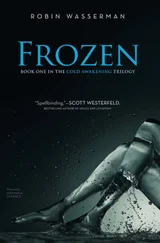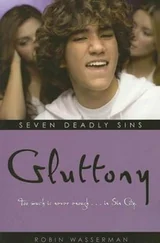“Schwarz is losing it,” Eric whispered. Thanks to his improvements, the mics were so sensitive that they picked up his every word. “Let’s speed this up.”
“Code names only,” Max reminded him. “We don’t know who might be monitoring this frequency. And whose idea was it to stick Grunt on the roof?”
“Mine. And it was a good one.” Eric flipped channels back to Schwarz, hoping he was right. “You still with us up there?”
“Susie Scott, Sally Sarell. Miss April, Linda Gamble. Ginger Young on the bed. Delores Wells on the beach, Teddi Smith, Miss—”
“Schwarz!”
“Ready for Phase Three.” The voice was pinched and nasal, with a hint of a whine. As usual. “Can you, um, please go faster?”
“We’re working on it.”
And back to Max.
“Last load,” Max confirmed. “Hoist it up, Chuckles, and I’ll meet you and Grunt on the roof in five.”
Eric began unhooking the metal grips and threading the wires back through, winding them in a tight coil. His cheeks burned in the wind. Unlike Max, he wore neither all black nor a mask for their missions, trusting the darkness to protect him—and, failing that, trusting the intruder alert sensors, which could never fail, because he had designed them himself. Max dressed for drama; Schwarz dressed however Max told him to. But Eric dressed for efficiency, flexibility, comfort, and speed. A gray T-shirt inside out, its faded message pressed to his skin: IF YOU’RE NOT OUTRAGED, YOU’RE NOT PAYING ATTENTION. His lucky socks, sneakers, Red Sox cap, and cargo pants—stuffed with lockpick, RF jammer, micro-scanner set to the police frequency, pliers, extra wire coils, a house key. He carried no ID. Just in case. If he missed something on the scanner, if their detectors failed, and a car pulled into the lot without advance warning, if someone, somewhere, heard something, and a cop appeared, there was always the all-purpose backup plan.
Ditch the equipment.
Forget the mission.
Run.
“Explain to me again why I have to be Chuckles and you get to be Cobra Commander?” Eric asked Max, hooking the line to his belt and giving it two quick tugs. There was a grinding sound, and then the ground fell away beneath him as the mechanism hoisted him up. He grazed his fingers against the brick facade; it scraped and tickled as the wires hauled him up to the roof.
It was nothing like flying.
“Because you always make me laugh,” Max replied in a syrupy sweet voice. “At least, your face does.”
“You’re hilarious.”
“Chuckles is a noble leader of covert operations for the G.I. Joe team,” Max said. “You should be proud.”
Eric snickered. “And you should stop playing with dolls.”
“They’re not—”
There was a pause. Eric hoped he wouldn’t have to hear the lecture again, the one about eBay and nostalgia items and untapped gold mines. The one that comprehensively—just not convincingly—explained why Max had a pristine collection of Pokémon Beanie Babies on his top closet shelf.
“Never mind. Suffice it to say, that’s why you don’t get to pick your own code name,” Max said. “You don’t have the proper respect. Consider this your punishment. Chuckles .”
Eric scrambled over the edge and, with a thin sigh, planted his feet on the rooftop. Schwarz had already hurried over to the opposite edge, to get started on Phase Three. “So what’d Schwarz do to deserve Grunt?” Eric whispered.
“ That’s not a punishment. That’s a description. Ever catch him with one of those vintage Playboys he loves so much?”
Eric made an exaggerated retching noise and flicked off the sound. Now if only, he thought, staring at Schwarz and wincing as he pictured what he desperately didn’t want to picture, he could shut off his brain.
Max was the one who finally explained it to me.
“Hacks. Not pranks. Never pranks. Pranks are for idiots.” He had his back to me. I’d interrupted him in pursuit of his other passion, hawking eighties nostalgia crap on eBay. That afternoon he was downloading photos of his latest acquisitions, a full collection of My Little Ponies, complete with Show Stable and Dream Castle. He’d pieced it together for a total of twenty-seven dollars, and planned to resell it for at least three hundred. Just another day at the computer for Max, who believed that if you didn’t clear at least a five hundred percent profit on any given transaction, you just weren’t trying.
“Pranks are for amateurs. Live-action jokes with a total lack of sophistication and purpose. Not to mention sobriety.” Warming to the lecture, he spun around to face me, skidding across the hardwood floor toward the couch. It was crimson-colored, like everything else in the Kim family’s house. I sprawled across it, my feet up on the side, shoes off, to keep Dr. Kim from having a heart attack on discovering I had scuffed his fine Italian leather. Max warned me that my socks would get Maxwell Sr.’s forehead vein pumping just as quickly.
They were a deep, rich, dark, true blue. A crayon blue. An M&M’s blue.
A Yale blue.
So I took my socks off too.
“Prankers have no vision,” Max complained. “Saran Wrap on the toilet, cows in the lobby, dry ice in the pool, chickens in the gym… .” He rolled his eyes. “So what? What’s the point? Gives us all a bad name. Even a good prank—even the best prank—is just funny. And then that’s it. Over. Forgotten. But a hack… you’re playing in a different league. Higher profile. Higher stakes. Higher calling.” His eyes glowed. I’d seen the look before, but only when he was talking about money. Always when he was talking about money.
“TP cubed,” he said. “Target, planning, precision, and purpose.” He ticked them off on his fingers. “That’s what we have, and they don’t. Worthy targets, long-term planning, technically sophisticated and precise execution—and a noble purpose. You want to make a statement, stand up for the right side. You want to take someone down who really deserves it.”
“And you want to be funny,” I added.
He glared at me like I’d just set fire to his My Little Ponies. “Funny’s beside the point. In 1961, the Cal Tech Fiendish Fourteen got sick of the annual invasion of Pasadena by football-crazed morons. So they hacked the Rose Bowl halftime flip-card show. They fooled two thousand University of Washington students into flipping over cards that combined to spell out CALTECH. There were more than ninety thousand people in that stadium. Millions more watching live on TV. You think they were going for funny?” His face twisted on the word. “It wasn’t about making people laugh. It was about achieving greatness.”
“Where’s the higher purpose in screwing up a halftime show?”
Max sighed, then turned back to his computer. “Forget it. Maybe it’s a guy thing.”
I glanced toward the stack of My Little Ponies.
He was lucky I didn’t have a match.
It took longer than expected, but by two a.m., Phase Three was completed.
Max stepped back, spread his arms wide, and gave the rooftop assemblage a nod of approval. “A masterpiece, boys. We’ve doneit again.”
Five rows of small desks and chairs faced an imposing, kitchen table–size desk and padded black office chair. Behind it stood one blackboard, complete with wooden pointer and blue chalk. Corny motivational posters hung from invisible walls—rows of fishing line strung at eye level. And, hanging above them, the pièce de résistance: one oversize, battery-powered clock, so that when Dr. Richard Ambruster, the desperate-for-retirement history teacher and current tenant of the now empty room 131, eventually found his classroom, precisely re-created on the Wadsworth High roof, he would be able to calculate his tardiness down to the second.
Читать дальше












